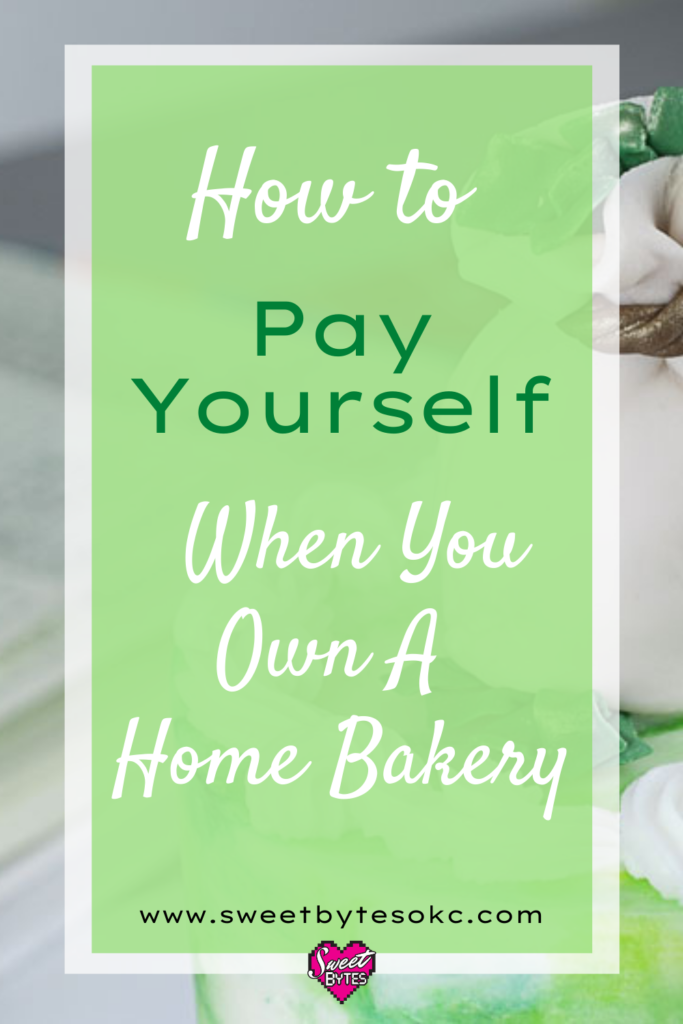Are you working very hard in your home bakery, but still haven’t figured out how to pay yourself? Are you getting ahead with the income you are earning or are you just getting run ragged by your baking business?
If you are doing well and making all the money you need, then you have it all figured out. Go put your feet up. If not, let me try to help you see the light. Let’s figure out how and why you should pay yourself!
Pay Yourself to Work for Yourself
The secret to making money in your baking business is to pay yourself. That sounds too easy, right? Well, that’s it. Pay yourself.
The trick is that you have to calculate your payment into the cost of the product.
If you charge $50 for a cake, the price of the cake should include the wages you paid yourself AND a profit for your business. This is where the lightbulb turns on.
Too many times, the money comes in, but it doesn’t end up in the wallet of the home business owner. It goes to overhead and operating expenses, the cost of running the business.
Sometimes home bakery owners can’t figure out what is going wrong and why they aren’t making any money. It seems simple: make a product, sell it, make money. Business around the world works like that, right?
Price Your Baking So You Can Pay Yourself
Where things go wrong is in the “sell it” part of the simple business plan.
You have to cover all of the expenses involved in running the business with the cost of the baked good. This includes your cut (the labor) and the bakery’s cut (the business.)
This isn’t always easy to do, sometimes emotional blocks keep home baking business owners from paying themselves for their work, and sometimes not knowing all of the numbers well enough keeps the business underfunded.
Really, I am speaking directly from experience.
As a noble home baking mom, I just loved baking and wanted to share. When I started, I undervalued my own baked goods because they were easy for me to make. Then, I undervalued my products because I thought that they baked should be a lot cheaper than a retail bakery since I made them at home. (NOT TRUE!)
Sadly, I also took pricing advice from unqualified advisors on internet forums as well as friends and family. I did things like charge double the cost of my ingredients based on the advice of someone who is notoriously frugal and would probably never pay for the extravagance of a custom cake anyhow anyplace.
When I finally got wise, I figured out I was only making .95 on each pie I sold (Yes… 95 CENTS!!!) I stayed up all night baking for 2 nights in a row and ended up with $94 one time. Even though I sold 91 pies… yeah…that’s about $2.50 an hour.
Definitely not my glory days and not what I expected to be paid for my time.
Value Yourself as a Professional
Even though I had a rough start, I knew I loved baking and wanted to grow my business – not die trying. Therefore, I started looking at myself as a business owner instead of a home baker and finally started to understand.
Not paying myself was not running a business. Businesses make money or they go out of business.
By getting to know my numbers and figuring out a wage that I was happy to receive at the time, I was able to price fairly for my customers and myself. I also raised my wages as I gained experience and reputation, which is fair too.
The more I learned about my home bakery business, the more I learned that it was better to be valuable than cheap. (For more about how to be valuable, read Be Valuable, Not Cheaper)
Professionals Get Paid for Their Work
As I thought more about it, I saw that I was actually diminishing the profession that I loved by not charging properly for my work. Undercutting the competition so extremely was decreasing the value of everyone else’s work.
When you pay yourself fairly, you are also valuing the collective of bakers and food professionals. When an industry is respected and performs well, everyone in it can benefit. Sadly, I didn’t understand that competing on price was the very last way that I should want to compete.
Sparing you deep details on what to charge here, I am just telling you it’s hard to decide how much you are worth. It can also be hard to ask people to pay more. (My article, How to Charge for Desserts, can help you with the whole process.)
If you are having trouble with the idea that you are a professional and deserve to pay yourself I want you to consider the professional services you are providing in exchange for the money. Here are just a few reasons why you should pay yourself:
- You are spending time that you could be spending doing something else.
- Likewise, you are saving them from spending the time having to create their own.
- You are creating something delicious and beautiful that probably took you years to master.
- Baking and decorating skills aren’t common, if everyone could do it, there would be no bakeries, bakers, or schools to teach these skills.
- The desserts are the part of the celebration or meal that everyone looks forward to. It will be the part everyone talks about for years to come.
- You are making your customer look good in front of their guests.
I could go on and on here, but truly take some time and figure out some other ways that you are providing value to your clients beyond “just dessert.”
How Much Should You Pay Yourself?
Some readers may be waiting for me to answer what dollar amount you should give yourself, but I can’t really do that for you. It has to be at least minimum wage per hour. I would think in the United States $15 an hour is a good wage to pay yourself if you are starting, but there are a lot of factors.
Are you selling simple, home-style baked goods, or are you a highly skilled pastry chef? Are you selling table cakes for desserts or are these wedding cakes? In my business, I added in one wage to the price for simple desserts and a different wage for specialty items that required custom work.
Since I could bake 5 pies in 2 hours, the price of the 2 hours’ wages was distributed over the cost of all 5 pies. However, making a wedding cake could take several hours and each of those hours’ wages would go into the price of the one wedding cake.
5 pies, 2 hours work = $30 wages/ $15 per hour = $3 added per cost of each pie.
1 wedding cake, 4 hours work = $120/ $30 per hour wages added to the cost of wedding cake.
The cost of the baked good is all the utilities, ingredients, packaging, marketing, etc. you have to pay to make the item. After that, you need to add on a little profit for the business.
Would an Employee Be Happy With What You Pay Yourself?
Finally, do this exercise if you still can’t bring yourself to imagine your wage: pay a pretend employee in your head. You can’t just hope there’s a little cash left over after you go to the store, that’s no way to treat yourself.
Imagine if you told employees, “Uh, I really don’t know what to pay you. Let’s just go buy everything we need and pay the bills and if there is anything left, you can have it.”
Or even this, “After the customer pays and we spend 23 hours making this cake… maybe there will be a little left to buy yourself a pizza… you love working here, right? It’s fun to you, right?”
I can hear the door slamming in my head as your imaginary employee just LEFT! Since you wouldn’t dare do that to an employee, PLEASE pay yourself too!
Gain the right clients when you pay yourself properly
You may be wondering if I lost customers or if my orders decreased. The answer is yes. I lost those customers that would send me a photo on Facebook and type messages like, “How much?” Also, I lost the customers who were only buying cheap baked goods.
My long-time customers didn’t quit ordering, but they ordered less frequently, which ended up being great. I got to be part of their truly special occasions instead of competing with the grocery store for their sweet tooth fix. Despite all that, my earnings increased. Yes, it’s true, I had half of the orders and made 3 times the money.
I can tell you something else from experience when you like the work you do, there is great satisfaction in getting paid well to do it. There is the pride in craftsmanship and responsibility for the product that makes it even better. I can put my whole self into baking and feel good about it because I know that I am exchanging fairly with my customer.
Questions?
If you have any questions, please don’t hesitate to ask. I’m happy to help.

More Resources For Small Baking Businesses:
Pricing for Profit at your Bakery is a no-nonsense article about getting the price right.
The Magic Pricing Formula is a simply stated article on pricing: Price = Ingredient Cost + Labor Cost + Allocated Overhead Cost + Profit from a guy who really knows his business numbers, Jason Kraft. Sadly, I don’t think he started the new site mentioned in this post.
How to Grow Your Cake Business: Craftsy Class
